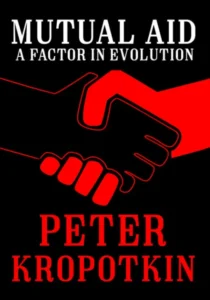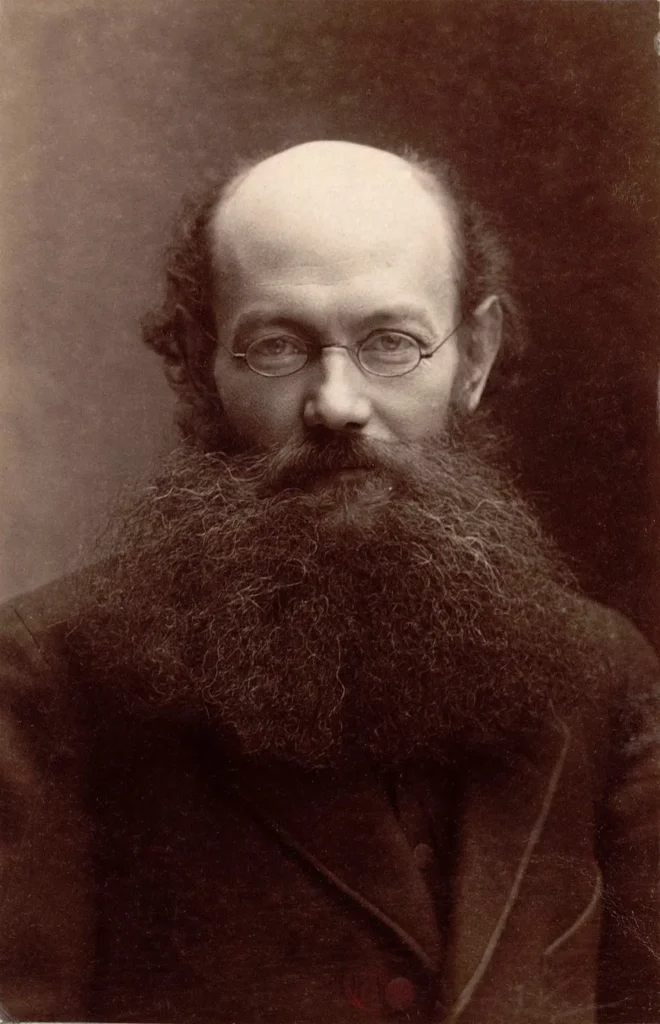Kinship in the Light of Conscience: Peter Kropotkin on the Crucial Difference Between Love, Sympathy, and Solidarity
INSPIRATIONAL, 14 Oct 2024
Maria Popova | The Marginalian – TRANSCEND Media Service
 “Every atom belonging to me as good belongs to you,” Whitman wrote in what may be the most elemental definition of solidarity — this tender recognition of our interdependence and fundamental kinship, deeper than sympathy, wider than love.
“Every atom belonging to me as good belongs to you,” Whitman wrote in what may be the most elemental definition of solidarity — this tender recognition of our interdependence and fundamental kinship, deeper than sympathy, wider than love.
Half a century after Whitman’s atomic theory of belonging and half a century before Dr. King’s “inescapable network of mutuality,” the scientist and anarchist Peter Kropotkin (December 9, 1842– February 8, 1921) examined the meaning of solidarity in his visionary 1902 book Mutual Aid: A Factor in Evolution (public library) — the culmination of his pioneering studies of the cooperation networks of social insects and his outrage at the destructive power structures and power struggles of human society, for which he was eventually imprisoned. After a dramatic escape, Kropotkin spent four decades in exile across Western Europe and went on to influence generations of thinkers with this radical insistence on cooperation and solidarity, not the struggle for power, as the true engine of survival and flourishing.
Having fallen under Darwin’s spell as a teenager, Kropotkin came to see in evolutionary science an optimistic model for the elevation of human conscience — in the history of life on Earth, across which organisms have continually improved their biological adaptation for survival, he found assurance for a better future forged by our continual moral improvement.
Unable to obtain the scientific education he yearned for, the young Kropotkin took a post as an officer in Siberia (where Dostoyevsky was serving in a labor camp), then used his military credentials to join geological expeditions studying glaciation, all the while witnessing staggering corruption and abuses of power in local government while the peasants governed themselves through deep bonds of mutual trust that seemed purer, more primal, and closer to nature than any political power structure.
Challenging the anthropocentric view of other animals, Kropotkin considers the deepest driving force beneath the harmony and coherence of nature:
To reduce animal sociability to love and sympathy means to reduce its generality and its importance, just as human ethics based upon love and personal sympathy only have contributed to narrow the comprehension of the moral feeling as a whole. It is not love to my neighbour — whom I often do not know at all — which induces me to seize a pail of water and to rush towards his house when I see it on fire; it is a far wider, even though more vague feeling or instinct of human solidarity and sociability which moves me. So it is also with animals. It is not love, and not even sympathy (understood in its proper sense) which induces a herd of ruminants or of horses to form a ring in order to resist an attack of wolves; not love which induces wolves to form a pack for hunting; not love which induces kittens or lambs to play, or a dozen of species of young birds to spend their days together in the autumn; and it is neither love nor personal sympathy which induces many thousand fallow-deer scattered over a territory as large as France to form into a score of separate herds, all marching towards a given spot, in order to cross there a river. It is a feeling infinitely wider than love or personal sympathy — an instinct that has been slowly developed among animals and humans in the course of an extremely long evolution, and which has taught animals and humans alike the force they can borrow from the practice of mutual aid and support, and the joys they can find in social life.
An epoch before Lewis Thomas speculated in his poetic case for why we are wired for friendship that “maybe altruism is our most primitive attribute,” Kropotkin adds:
Love, sympathy and self-sacrifice certainly play an immense part in the progressive development of our moral feelings. But it is not love and not even sympathy upon which Society is based in mankind. It is the conscience — be it only at the stage of an instinct — of human solidarity. It is the unconscious recognition of the force that is borrowed by each person from the practice of mutual aid; of the close dependency of every one’s happiness upon the happiness of all; and of the sense of justice, or equity, which brings the individual to consider the rights of every other individual as equal to his own.
Complement with Albert Camus on what solidarity means and Lewis Thomas’s forgotten masterpiece of perspective on how to live with our human nature, then revisit Kropotkin on how to reboot a complacent society and the art of putting your gift in the service of the world.
_______________________________________
 My name is Maria Popova — a reader, a wonderer, and a lover of reality who makes sense of the world and herself through the essential inner dialogue that is the act of writing. The Marginalian (which bore the unbearable name Brain Pickings for its first 15 years) is my one-woman labor of love, exploring what it means to live a decent, inspired, substantive life of purpose and gladness. Founded in 2006 as a weekly email to seven friends, eventually brought online and now included in the Library of Congress permanent web archive, it is a record of my own becoming as a person — intellectually, creatively, spiritually, poetically — drawn from my extended marginalia on the search for meaning across literature, science, art, philosophy, and the various other tendrils of human thought and feeling. A private inquiry irradiated by the ultimate question, the great quickening of wonderment that binds us all: What is all this? (More…)
My name is Maria Popova — a reader, a wonderer, and a lover of reality who makes sense of the world and herself through the essential inner dialogue that is the act of writing. The Marginalian (which bore the unbearable name Brain Pickings for its first 15 years) is my one-woman labor of love, exploring what it means to live a decent, inspired, substantive life of purpose and gladness. Founded in 2006 as a weekly email to seven friends, eventually brought online and now included in the Library of Congress permanent web archive, it is a record of my own becoming as a person — intellectually, creatively, spiritually, poetically — drawn from my extended marginalia on the search for meaning across literature, science, art, philosophy, and the various other tendrils of human thought and feeling. A private inquiry irradiated by the ultimate question, the great quickening of wonderment that binds us all: What is all this? (More…)
Go to Original – themarginalian.org
Tags: Consciousness, Cooperation, Corruption, Humanity, Love, Power, Social structures, Solidarity
DISCLAIMER: The statements, views and opinions expressed in pieces republished here are solely those of the authors and do not necessarily represent those of TMS. In accordance with title 17 U.S.C. section 107, this material is distributed without profit to those who have expressed a prior interest in receiving the included information for research and educational purposes. TMS has no affiliation whatsoever with the originator of this article nor is TMS endorsed or sponsored by the originator. “GO TO ORIGINAL” links are provided as a convenience to our readers and allow for verification of authenticity. However, as originating pages are often updated by their originating host sites, the versions posted may not match the versions our readers view when clicking the “GO TO ORIGINAL” links. This site contains copyrighted material the use of which has not always been specifically authorized by the copyright owner. We are making such material available in our efforts to advance understanding of environmental, political, human rights, economic, democracy, scientific, and social justice issues, etc. We believe this constitutes a ‘fair use’ of any such copyrighted material as provided for in section 107 of the US Copyright Law. In accordance with Title 17 U.S.C. Section 107, the material on this site is distributed without profit to those who have expressed a prior interest in receiving the included information for research and educational purposes. For more information go to: http://www.law.cornell.edu/uscode/17/107.shtml. If you wish to use copyrighted material from this site for purposes of your own that go beyond ‘fair use’, you must obtain permission from the copyright owner.
